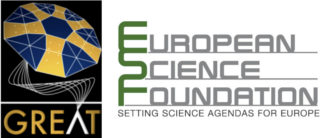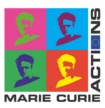Introduction to GREAT-ITN
Full details concerning the GREAT-ITN are available at the GREAT ITN website - see http://www.great-itn.eu
The Information below is now of historical value only.
The pages here provide some interim information concerning the GREAT Marie-Curie Initial Training Network and details about the currently open ESR vacancies.
Gaia is the ESA cornerstone mission set to revolutionise our understanding of the Milky Way. This proposal will shape a critical mass of new expertise with the fundamental skills required to power the scientific exploitation of Gaia over the coming decade and beyond.
The GREAT-ITN research theme is 'Unravelling the Milky Way' focused on four fundamental problems: unravelling the origin and history of our home galaxy; tracing the birth place and understanding the astrophysical properties of the stellar constituents of our galaxy; deepening the understanding of planetary systems by linking the study of exoplanets to the origins of the solar system; take up the grand challenges offered by Gaia in the domains of the distance scale and the transient sky.
The 12 GREAT-ITN partners in Europe, and 1 in China, each have world leading expertise. 19 additional associate partners provide access to complementary expertise and facilities. The network includes three associates from the Information Technology industry: Microsoft, InterSystems and The Server Labs, each driving the new global 'on-line' agenda. The European Space Agency provides the vital interface to the Gaia project, and exposure to the Space industry.
The network will commence 1 March 2011 and have a 4 year duration - thus to 28 Feb 2015.
The full partners of the network are:
- Institute of Astronomy, University of Cambridge, UK
- Leiden Observatory, Leiden University, NL
- Lund Observatory, Lund University, S
- Dept Astronomia i Meteorologia, University of Barcelona, E
- ARI, Zentrum fur Astronomie, University of Heidelberg, D
- MPIA, Heidelberg, D
- Geneva Observatory, University of Geneva, CH
- Instituut voor Sterrenkunde, Catholic University of Leuven, B
- Department of Astronomy, Peking University, CN
- INAF (Bologna and Padua), I
- Poznan Observatory, Adam Mickiewicz University, PL
- CAUP, University of Porto, P
- CNRS (Bordeaux and Besancon), F
The network will support the training of 17 Marie Curie Early Stage Research (ESRs) Fellows - to be hosted across the main partner institutes of the network. Preliminary information concerning these ESR positions (and the associated PhD research projects which each ESR will embark upon) are now available.
The GREAT-ITN coordinator is Dr Nicholas Walton at the IoA, Cambridge (naw@ast.cam.ac.uk) - to whom enquiries can be directed.

